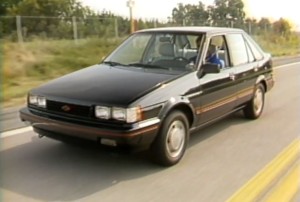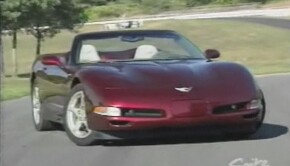Chevrolet

Published on February 13th, 2020 |
by BajaBusta
1988 Chevrolet Nova Twin-Cam Test Drive

It was the late eighties, and at long last, Chevrolet was offering a car with a double-over-head-cam engine (since the Vega Cosworth), the symbol of high performance from Nagoya to Trollhättan. Ironically, though, Chevy’s new engine came from Toyota, the worlds largest manufacturer of double-over-head-cam engines – more than two million in 1987, as a matter of fact.
The recipient of Toyota’s generosity was the Chevy Nova, manufactured in California as part of a cooperative agreement with General Motors. This version of Toyota’s fourth-generation Corolla became a vigorous seller for Chevrolet across the country, and the new sixteen-valve Twin-Cam was meant to boost its visibility further.
The fuel-injected engine came directly from the slow selling Corolla FX16 (also made at NUMMI), and delivered 110-bhp at 6600 rpm, a 47 % increase over the standard 1.6-liter engine. The engine’s performance was backed up with four-wheel disc brakes, 22 percent stiffer shocks and springs, front and rear anti-roll bars, and alloy wheels with Goodyear Eagle GT rubber.
It looked good in its mandatory black-with-red-trim uniform, and the underlying Corolla package was extremely space efficient.
The Nova continued to be a real value in small cars, and it had a well-earned reputation for reliability. But the Twin-Cam proved again that an automobile was more than a set of blueprints, especially when it comes to performance.

1988 Chevrolet Nova Manufacturer Promo
1988 Chevrolet Nova Twin Cam Dealer Training Video
1986 Chevrolet Nova Manufacturer Promo
1985 Chevrolet Nova Manufacturer Promo
Tags: 1988, 1988 Chevrolet, 1988 Chevrolet Nova Twin Cam, 1988 Chevy, Cam, Chevrolet Nova, Chevrolet Nova Twin-Cam, chevy nova, consumer reports, Corolla, Fremont California, FX16, General Motors, GM, how reliable are, how reliable is, jd power, Motorweek, Nova Twin Cam, Nova TwinCam, NUMMI, Review, road test, Roadtest, Tesla, test drive, Testdrive, Toyota, Toyota Corolla FX16, Twin














Pingback: » 1984 Toyota Corolla Commercial